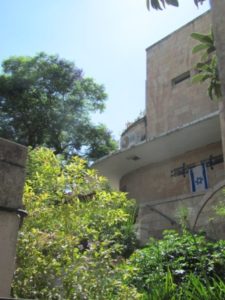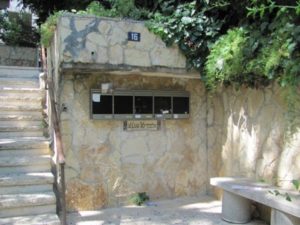When we hear the name Jerusalem it reminds us of history, holiness and mysticism, however Jerusalem is also a city of passion. For thousands of years it was a dwelling place for people made of flesh and blood who lusted, envied, yearned, longed and if they were lucky, even loved and were loved by others. The stories of love and lust that involve Jerusalem are told throughout history and go back at least to King David’s time. These stories of happiness, disappointments and broken hearts show us a different, human and intriguing perspective of Jerusalem. Today I would like to tell again the stories of three women who lived in Jerusalem and shared one name – Lea.
In the year of 1930, in Alexandria, Egypt, a Christian-Arab lawyer, Nasib Abkarius Bay and a daughter of a well known ultra-orthodox family from Jerusalem, Lea Tenenboim were wed. Abkarius loved his wife with all his heart and did his best to be a loving husband and fulfill every wish, desire and caprice Lea expressed. He built a large house in Rehavia Neighborhood in Jerusalem and hired house maids and servants that will do her bidding. The house looked like a magnificent palace and showed some influence of the architectural international style. It was a combination of the practical and the authentic, straight lines and Jerusalem stone, a combination of simplicity and splendor. The problem was that although Lea Tenenboim was much loved she was not happy. A year after she and Abkarius moved into “Villa Lea” (this is the writing that can be seen on the outer wall of the house till today) Lea Tenenboim sneaked out with a new lover to Egypt after spending a large sum of Abkarius`s money and left him broke and broken hearted. They divorced officially in 1945 and a year later Abkarius died poor and lonely. Villa Lea was rented out in the market. Some of its residents were much interesting figures. The exiled emperor of Ethiopia Haile Selassie lived there and so did some Israeli ministers. Moshe Dayan and his daughter Yael Dayan lived in Villa Lea. There were also some students living there for a few years. Today Villa Lea is a private house, however not long ago the house was opened to the public as a part of the “Houses from within” project in Jerusalem. The long line of visitors we could see that day waiting to enter the house only emphasizes the power a story like Lea Tenenboim’s fictitious love has over people till today.
As opposed to Lea Tenenboim Lea Goldberg, the famous Israeli poet, lived a life of loneliness and heartbreak. Her life filled many diaries and some of the most beautiful poems ever written in Hebrew. Lea Goldberg never married though she fell in love with many men. At first she loved older men and in later years she turned her heart to men much younger than her. None of them ever knew about her secret love for them. Lea Goldberd moved to Jerusalem in 1950 after she got a position at the Hebrew University. She lived in Alfasi St. in Rehavia. From her small flat in Jerusalem she taught, wrote, drew a lot of paintings and loved. One painful love of hers was Jacque Adout, a young man who was teaching French and reported for “Kol Zion Lagola” (The voice of Zion to the Diaspora). This love, like all her other unfulfilled ones, left Lea Goldberg scarred, however it also resulted in a most fruitful and creative period in her life. Goldberg wrote in her privet diaries about Adout saying he has made his contribution to her writing. In these diaries we find a nice description of one magical day in Jerusalem with Jacque: “…That single day in Jerusalem, the golden light shining on houses, the rocks, the fields. Hopeless bliss, happiness as if you are standing in front of a lovely picture, a work of art. that magic of ‘A’ – it was like another revelation and made me happy. Because I know his heart is not intended to me I write this in order to remember I once had a day like that…”
Jacque Adout was the inspiration for Lea Goldberg when she wrote the cycle “Love of Tereza de-Mon”. One of the most known verses in the cycle seams as if it refers to the same golden day in Jerusalem:
From my window as well as from yours
The same garden and view can be seen
And I can love for a whole day
The things that were caressed by your eye
In front of your window as well as in front of mine
The same nightingale sings at night
And when your heart trembles while sleeping
I will wake up and listen to it to.
(Sonnet no.9 “Love of Tereza de-Mon)
Lea Goldberg lived her life alone and without hope and when we pass by her flat in Rehavia while touring Jerusalem it should be easy enough for us to imagine her sitting at the window thinking about another window – the one belongs to her secret love. At this moment we should remember what she wrote about herself in her diaries: “I am poor in this world, as I don’t have a single whole value. I am writing this for the first time in my life: I have no purpose, no love, no faith, I have nothing.” While reading this we get a sad filling but we can also consider ourselves lucky for being able to love back a great poet who was never loved in her whole life.
Our third Lea was the luckiest. Lea Abushded loved and was loved dearly. Her lover was Itamar Ben-Avi, son of Eliezer Ben-Yehuda, the reviver of the Hebrew language (here is a nice Sesame Street cartoon about him) (“Avi” in Hebrew represent the initials of Eliezer Ben-Yehuda. Itamar’s original name was Ben-Zion Ben-Yehuda and when he grew up he decided to changed both his first and last name to something more Israeli with a tribute to his father). Itamar met Lea Abushded when he was 26 years old and she was 16. The mutual love was not welcomed by Lea’s family because of the gap between classes. Itamar came from a poor family and was not considered a suitable husband for a girl from a respectable family like Lea’s. Seeing that the situation is hopeless Itamar started to use his father`s newspaper to publish some feverish love poems. The people of Jerusalem were thrilled by the public scandal and followed the papers eagerly. Eventually it seamed that things were going out of control when one of the poems that was printed had a clear threat of suicide in it:
My Pistol
Ever since I loved her and my heart aches
My pistol will never leave my sight
Between the books of my mind
On my beloved desk
It breaths death to me
As I am fed up with everything – even with my beauty,
Who chose to live like that without me,
Wait just a minute Oh my beauty
In a moment you shall weep endlessly
The song motivated the people of Jerusalem to help Itamar`s father to make a plea to Abushded family and this time he got the family’s consent. After another two years of engagement and surrendering to some financial blackmail they married each other. Their great love came to an end by Itamar`s untimely death in 1943. Lea Ben-Avi lived without Itamar for many years after he passed away. In an interview conducted by her grandson, Gil Chovav in “Kol Hair” newspaper she said: “Bension (Her way of pronouncing Ben-Zion) was really poor, but what would I get from the reach ones? One of them, Valiro was a big miser, the other, Shlush? His mother always tried to tell me what to do and I can’t stand her kind, the third went to Constantinople and lost all his money. Bension was poor but he really had a wide heart. Yes, he was generous. Don’t you think he made me miserable, even if I tend to complain. He was handsome he was like fire, the prince of Judea – this is what the women called him. This was until the poor man died”. Gil Hovav writes that until her death in 1982 he was reminded by his grandmother time and again that she renounced wealth and comfort but she always believed it was worth it.
The story of Lea Abushded and Itamar Ben-Avi is well known and a famous song called “The love of Itamar Ben-Avi” was written by Dudu Barak and Nurit Hirsch. The words of the chorus “…If my Lea you only loved me” refer us to another poem written by Itamar. In this poem Itamar used the fact that Lea`s name in transpotion of letters can be read Ela meaning goddess:
If only you loved me my Ela as I love you.
If only you were perplexed by day and crazy by night
If only was your heart was humming like a bloody tempest
And your eyes within your eyelids if only they became soaked by tears
I only you dreamt happiness for ever and awoke in panic
And in your weary mind if only lightning had pass
Hurrah, then you might understand me”
Three Lea’s, one city and such different stories. I have a friend who used to say that if we took a tear for every love story that was told in Jerusalem we shall not worry again for a shortage of fresh water in Israel. Who knows? Maybe he is right, however I do know that in a city like Jerusalem which is greater than life you could find love stories greater than life. You just need to take a tour in Jerusalem and look for them.

